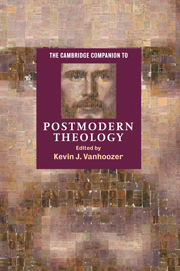Book contents
- Frontmatter
- Part 1 Types of postmodern theology
- 1 Theology and the condition of postmodernity
- 2 Anglo-American postmodernity
- 3 Postliberal theology
- 4 Postmetaphysical theology
- 5 Deconstructive theology
- 6 Reconstructive theology
- 7 Feminist theology
- 8 Radical orthodoxy
- Part 2 Christian doctrine in postmodern perspective
- Index
6 - Reconstructive theology
from Part 1 - Types of postmodern theology
Published online by Cambridge University Press: 28 May 2006
- Frontmatter
- Part 1 Types of postmodern theology
- 1 Theology and the condition of postmodernity
- 2 Anglo-American postmodernity
- 3 Postliberal theology
- 4 Postmetaphysical theology
- 5 Deconstructive theology
- 6 Reconstructive theology
- 7 Feminist theology
- 8 Radical orthodoxy
- Part 2 Christian doctrine in postmodern perspective
- Index
Summary
Reconstructive postmodern theology derives its philosophical bearings from the movement in which Alfred North Whitehead is the central figure, with William James and Charles Hartshorne being, respectively, the most important antecedent and subsequent members. Although theology based on this movement has widely been known as “process theology,” not all process theology is properly called postmodern. Process theology is reconstructive postmodern theology insofar as it thematizes the contrast between the modern and the postmodern, emphasizes the distinctively postmodern notions in Whiteheadian philosophy, employs these notions for deconstruction of classical and modern concepts and for ensuing reconstruction, and relates the resulting position to other forms of postmodern thought. Although this form of postmodern thought has generally been called “constructive,” as in the title of the State University of New York Press Series in Constructive Postmodern Thought, the term “reconstructive” makes clearer that a prior deconstruction of received concepts is presupposed.
ORIGINS
Although the term “postmodern” was not used by Whitehead himself, the notion is implicit in his 1925 book, Science and the Modern World, in which he says that recent developments in both physics and philosophy have superseded some of the scientific and philosophical ideas that were foundational for the modern world. Whitehead’s most explicit statement about the end of the modern epoch occurs in a discussion of William James’ 1904 essay “Does Consciousness Exist?,” the crux of which Whitehead takes to be the denial that consciousness is a stuff that is essentially different from the stuff of which the physical world is composed.
- Type
- Chapter
- Information
- The Cambridge Companion to Postmodern Theology , pp. 92 - 108Publisher: Cambridge University PressPrint publication year: 2003
- 1
- Cited by



